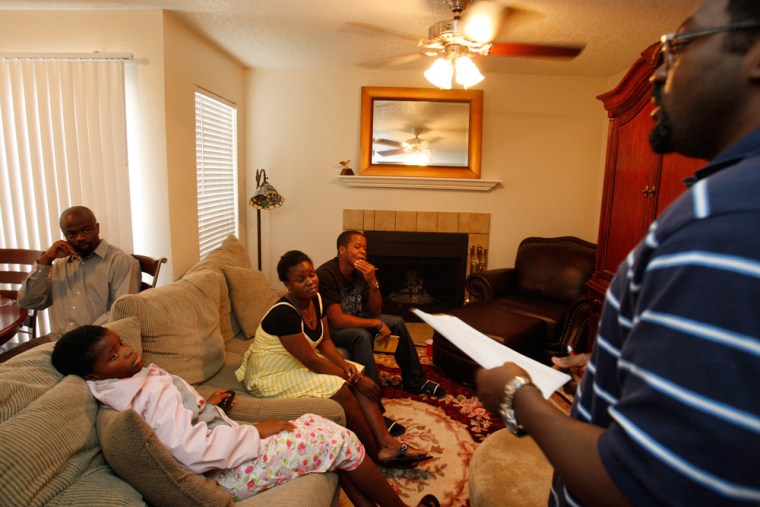The gathering Friday night in Daryl Berry’s house in this suburban city 20 miles south of Seattle was both a dozen people sitting around talking in a den and a history-making political event.
The talkfest, one of some 3,000 taking place this weekend at houses, churches and coffee shops across the country, marked the first time that the Democratic National Committee has summoned the supporters of President Barack Obama using the Web-based tactics that got him elected.
“I hope to sign the recovery plan into law in the next few weeks,” Obama said last week in an e-mail invitation to the meetings sent to the roughly 13 million people on his 2008 campaign list. “But I need your help to spread the word and build support.”
To build a wall between Obama’s White House and the political organization he built, the mailing list and his Web site, BarackObama.com, are now maintained by the DNC. Beginning with this weekend’s meetings, the DNC is hoping to use the Internet-initiated gatherings that helped propel him to the White House to build grassroots support for his initiatives and, before long, to assist Democratic candidates in upcoming elections. The idea is similar to the "Meetups" strategy employed by Howard Dean's 2004 presidential campaign and the grassroots organizing that liberal groups such as Moveon.org have been doing for years.
The two-hour meeting at Berry’s house in Renton showed just how unpredictable these gatherings can be, as what happens is largely determined by the individual personality and preoccupations of the host. That means Obama and the DNC are depending on people they do not know and who aren’t accountable to them.
Berry, a mathematician and data mining consultant with the didacticlecturing style of a college professor, made it clear at the start that his main goal for the evening was to deliver a PowerPoint presentation on the necessity for a national government-administered medical insurance system, not talk about the economic stimulus legislation that is currently at the center of political wrangling in the Senate.
The Obama movement, Berry said, had changed American politics. “We’re going to force politicians to do what we want now. We’re the lobbyists. We’re going to make it happen,” he told his guests, who sat in folding chairs and intermittently snacked on chicken nuggets and sipping the soda or beer provided by Berry.
'Community organizing mentality has continued’
Michael Maxon, an e-commerce entrepreneur who attended the meeting, said that Obama’s “community organizer” identity — much derided by Republicans in last year’s campaign — turned out to be one of the keys to his success. And he applauded the DNC's effort to keep it thriving.
"Even after the election, where there’s usually a drop-off and people go their way, this same community organizing mentality has continued and I find that fascinating,” he said.
Berry did not spend much time discussing the economic stimulus bills currently before Congress, although at one point he cited New York Times columnist and Nobel laureate Paul Krugman in arguing that a $700 billion or $800 billion bill was too small to jump-start the ailing economy.
Before Berry’s lecture on national health insurance, the assembled Obama supporters — all middle-aged and at least three of them unemployed — engaged in free-wheeling discussion that rambled from immigration to the cost of political campaigns to rationing of medical care.
The conversation took a few strange turns. Daniel Caulfield, a statistician who recently lost his job at Washington Mutual, said of the recession: “We deserved it. We actually need the recession.” Without such an economic correction, he said, unlimited economic growth would encourage global overpopulation.
The meeting took place in the congressional district of Rep. Dave Reichert, a Republican who voted against the Democratic stimulus plan last week in the House.
Reichert had tough races in 2006 and 2008 against Democrat Darcy Burner, and his vote against the stimulus will likely be an issue in next year’s election. At least two of those attending Berry’s meeting said they had worked as volunteers on Burner’s unsuccessful 2008 campaign.
Will stimulus vote haunt GOP congressman?
While Reichert won the November election with 53 percent of the vote, there was general agreement at the Renton gathering that he’ll be defeated in 2010 because he isn’t in tune with his district.

“I kind of like the guy,” said Rebecca Teeters, who came from the nearby city of Kent. “Environmentally he’s done some good things. But I was really disappointed he didn’t go along with the president on the stimulus.”
If these meetings are intended to influence members of Congress, would a member such as Reichert listen to these people, many of whom have voted against him and worked to defeat him and will likely vote against him again next year?
Berry’s group, at least, was not a representative sample of the electorate. There were no Republicans on hand, which prompted one attendee, Victor Eskenazi, to ask, “Are there many Republicans who are partaking in these meetings?”
Even if they are not, the Democrats in attendance said they hoped Republicans would back Obama. Maxon said he hoped the stimulus bill gets some bipartisan support “because if it doesn’t, I think you’re looking at four years of us versus them. I’m really hoping to see a change from that.”
Before the PowerPoint presentation, the group in Berry's den watched a DNC-produced video in which the party chairman, Gov. Tim Kaine of Virginia, urged them to “advocate for the stimulus plan” because “we have to have people to go to bat for the plan.”
DNC: Meetings kept informational
But DNC spokesman Damien LaVera said the purpose of the gatherings was not to spur people to call on members of Congress to vote for the stimulus legislation. Instead, he said, it was to explain what the plan means for each town, city and congressional district. “It’s not about getting 3,000 people to get 30 of their friends to call their member of Congress,” he said.
Part of the DNC’s success in past few years has come from building a new national voter file. This weekend’s attendees who aren’t already in the DNC file will have their names and e-mail addresses added to that list.
In addition to trying to build support for Obama’s initiatives, the DNC will shift gears late this year or early next year and turn the house-party attendees into part of its campaign apparatus for 2010 campaigns, when all the House members and many of the senators who vote against Obama’s plan will be on the ballot.
Joe Trippi, a pioneer of Internet-based campaign tactics who managed the Dean campaign, called this weekend’s meetings part of a historic advance comparable to the first Wright Brothers flight.
“This is the first time an administration is trying to use these tools (as were used in the Dean campaign) to affect its agenda, just as the Kennedy administration was the first to really understand and use television,” Trippi said. “Because they are pioneers, like the Wright Brothers, I think they’ll make their share of mistakes.”
He added, “The only question I have is putting this under the DNC umbrella, when they’re talking about bipartisanship and trying to stop being polarizing.” Trippi wondered whether the DNC sponsorship might, “start to trigger more partisanship, instead of citizens getting together to rally around the president. I worry about it becoming inadvertently more partisan than administration wants.”
But he added, “The intention is good. I hope it works.”
Republicans are warily watching this weekend’s events.
“While it’s certainly an impressive political tactic, the fact of the matter is the American people have problems with substance of the (stimulus) bill,” said Ken Spain, a spokesman for National Republican Congressional Committee. “Support continues to erode as the public finds out what is in the bill.”
Yet Republicans can’t help but admire the technologically sophisticated Obama/DNC organization.
It has been a long time since any president polled with such lofty approval ratings as Obama’s. If they are still at that level when the 2010 elections arrive, it will be perilous for Reichert or any congressional Republican to run against the Obama record.
